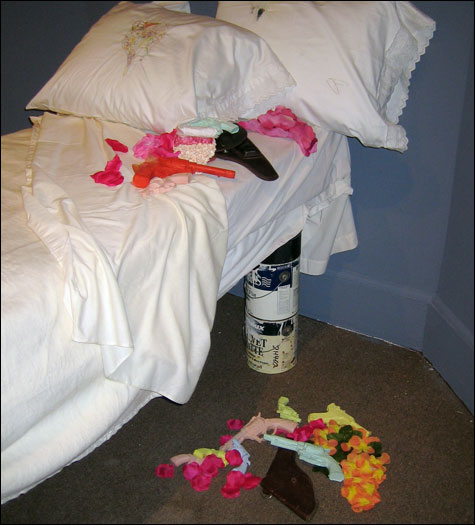
FORCED REMOVAL: Ilona Anderson’s subjects are domestic violence, as a by-product of apartheid,
and AIDS. |
“Reflections In Exile: Five Contemporary African Artists Respond To Social Injustice” | Museum of the National Center of Afro-American Artists, 300 Walnut Ave, Boston | Through July 27 Slideshow: Reflections in Exile |
In recent weeks, Chaz Maviyane-Davies has been e-mailing out broadsides again. His “graphic commentaries,” as the Zimbabwe native calls them, are vivid digital posters indicting Zimbabwe’s president, Robert Mugabe, as a craven thug and the international response as feckless.Zimbabwe has been riven by violence since opposition leader Morgan Tsvangirai won the first round of a presidential election in March. Tsvangirai dropped out of the June 27 runoff vote because of violent physical attacks on his supporters. On July 1, the African Union called for a government of national unity in Zimbabwe to heal the nation’s political wounds. Maviyane-Davies’s response: flies crawling over a cut in a slab of red meat shaped like Africa, with, across the top, “Another slice of African unity.”
Eight earlier posters are the highlight of “Reflections in Exile: Five Contemporary African Artists Respond to Social Injustice” at the Museum of the National Center of Afro-American Artists in Roxbury. The show collects work by five immigrants, four of them now living in Greater Boston, the fifth a former MassArt student.
Maviyane-Davies left his homeland in 2001. “It was because I was doing those commentaries that I had to leave for my own safety,” he tells me. He had been designing graphics promoting social justice for women’s and environmental groups and other nongovernmental organizations. During the run-up to the 2000 referendum vote and parliamentary elections, he’d spend nights designing one or two graphic commentaries and then e-mailing them to some 500 people. They are sharply composed, boiling big issues down to a few visceral visual metaphors.
In Flag, the red stripes of Zimbabwe’s flag drip down like blood. DRC, a photographic-looking image of diamonds and blood balanced on a scale, charges that Mugabe sent troops to fight in the Democratic Republic of Congo’s civil war because Zimbabwe was profiting from diamond mining there. Medals of Dishonor uses an image of silvery skull medals pinned to the breast of a green military uniform coat to criticize the Zimbabwe military’s fealty to Mugabe.
“I put them on the Internet, and anyone that could use them could use them,” he says. “There were times when I did worry about the risk. But as far as I’m concerned, everybody’s got to do something.”
Mugabe was seen as a liberation hero when he became leader of Zimbabwe as it achieved independence from white minority rule in 1980. But Mugabe the president became a tyrant focused on holding and extending his power. Voters defeated the non-binding 2000 referendum, which would have changed the country’s constitution, given him greater power (including the ability to dissolve Parliament without cause), and allowed him to seize white-owned commercial farms without compensation. “It was the first time the problems started to arise that we see today, because it was the first time Mugabe felt threatened,” Maviyane-Davies explains. “He doesn’t want to relinquish power. He’s a greedy, corrupt, arrogant politician.”
Despite losing the referendum, Maviyane-Davies goes on, Mugabe consolidated his power, adjusting laws to criminalize criticism of him. “All of a sudden he changed those laws and made everything I did illegal.” Fearing for his own safety and that of his wife and his two-year-old daughter, he put out word that he was leaving. He was offered a job teaching graphic design at MassArt, where he continues to work.
“Mugabe is a ruthless dictator. There are no two ways about it. People [outside Zimbabwe] are only beginning to see it now, but we knew it for a long time.” The posters are a way to spread the word. “You want the world to see it, you want people to know.”
The artists whose work is featured in “Reflections in Exile” address turmoil — from war to poverty to AIDS to despotic leaders — in post-colonial Africa. The show was organized by Barry Gaither of the National Center of Afro-American Artists and Candice Smith Corby, a member of the exhibitions committee at the South Shore Art Center, where the “Reflections” premiered in April.
Salem Mekuria, an Ethiopian who lives in Wellesley, presents Ruptures, a 22-minute video triptych installation. It’s an impressionistic history of the past century in Ethiopia, touching on the defeat of Italian forces intent on colonizing the country in 1896 and 1935. Here’s Ethiopian emperor Haile Selassie, a leading figure in the 1963 formation of the Organization of African Unity, which in 2002 was superseded by the African Union. He was overthrown during a Communist uprising in 1974. An elderly mother visits a mass grave where she believes her son, who was killed during the ensuing fighting, is buried. “They killed so many people through the night, so many young people. And they scooped up my son and the others onto waiting trucks, as if they were dirt. I am sure here is where they dumped him.” Revolutionaries wave signs saying “Land to the Tiller.” A boy drives a plow behind an ox. Mengistu Haile Mariam, the Communist dictator who was in charge in the 1970s, during what became known as the “Red Terror,” rants. Soldiers fight. A statue of Lenin lies toppled in a mud puddle. A woman talks of being HIV-positive. (“At times I already feel dead.”) Cattle wander a city street. People scavenge bottles and food from a garbage dump.